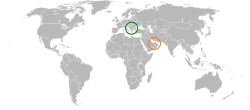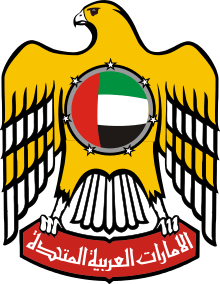Kosovo–United Arab Emirates relations
 |
|
Kosovo |
United Arab Emirates |
|---|---|
Kosovo–United Arab Emirates relations are foreign relations between Kosovo[a] and the United Arab Emirates.
Diplomatic Relations
Kosovo declared its independence from Serbia on 17 February 2008 and the United Arab Emirates recognised it on 14 October 2008.[1][2] Kosovo plans to open an embassy in the UAE.[3] On 27 April 2010, the United Arab Emirates designated Khalid Khalifa Al-Mualla, who is the Emirati ambassador to Turkey, as its non-resident ambassador to Kosovo.[4]
On 13 March 2014, Kosovo and the UAE agreed to open mutual embassies, organise a forum for businessmen in Abu Dhabi to explore investment opportunities in Kosovo and signed a cooperation agreement between the two countries in the field of air transport services.[5]
History
After the Serbian government launched a major offensive against the ethnic Albanian population in Kosovo in 1998, the UAE called for international intervention and commenced a major program of humanitarian relief through its Red Crescent Society. In 1999, the UAE was among the first non-NATO states to voice support for NATO's bombing campaign.[6] During the UN administration period, the UAE maintained almost 1,500 peacekeeping and special operations troops in Kosovo.[7] The UAE was the only Muslim state to offer to participate in the Kosovo Force and its commitment was the first operational deployment of UAE forces outside the Middle East region.[6] As of October 2008, these forces remained in Kosovo and between 1998 and 2008, the aid given to Kosovo by the UAE’s Red Crescent Authority alone cost Dh125 million, the biggest international humanitarian mission in the UAE's history.[8]
See also
Notes and references
Notes:
| a. | ^ Kosovo is the subject of a territorial dispute between the Republic of Kosovo and the Republic of Serbia. The Republic of Kosovo unilaterally declared independence on 17 February 2008, but Serbia continues to claim it as part of its own sovereign territory. The two governments began to normalise relations in 2013, as part of the Brussels Agreement. Kosovo has received recognition as an independent state from 110 out of 193 United Nations member states. |
References:
- ↑ "UAE recognises Kosovo". Emirates News Agency. 2008-10-14. Retrieved 2008-10-14.
In accordance with its firm support for the principle of the legitimate right of peoples to self-determination, the United Arab Emirates has announced its recognition of the Kosovo Republic as an independent and sovereign state.
- ↑ "UAE recognises Kosovo". IC Publications. 2008-10-14. Retrieved 2008-10-14.
- ↑ "Kosovo Plans Diplomatic Offensive for '09". Balkan Insight. Archived from the original on May 13, 2009. Retrieved 2009-05-29.
'We are also planning to open an embassy in Japan, to maintain contacts with Asia, in Colombia for Latin America, and eventually in the United Arab Emirates', said Beqiri.
- ↑ "Ambasadori i Emiratave të Bashkuara Arabe i dorëzon kopjen e letrave kredenciale Ministrit Hyseni " mfa-ks.net 27 April 2010 Link retrieved 27 April 2010 (Albanian)
- ↑ "UAE, Kosovo sign air transport agreement". Gulf News. 13 March 2014. Retrieved 13 March 2014.
- 1 2 Abed, Ibrahim; Peter Hellyer (2001). United Arab Emirates, a new perspective. Trident Press.
The UAE's active interest in the Balkans was again stimulated by the conflict in Kosovo, whose autonomous status within Serbia had been abolished in 1989. ...
- ↑ "UAE to Keep Troops in Kosovo". Global Policy Forum. Retrieved 2009-05-29.
The commander of the United Arab Emirates military vowed on Monday to keep its peacekeepers in Kosovo for at least two more years, a mission that has raised the Gulf Arab state's international profile.
- ↑ It’s not enough for the UAE just to recognise Kosovo

